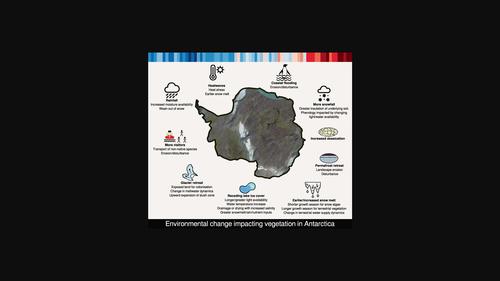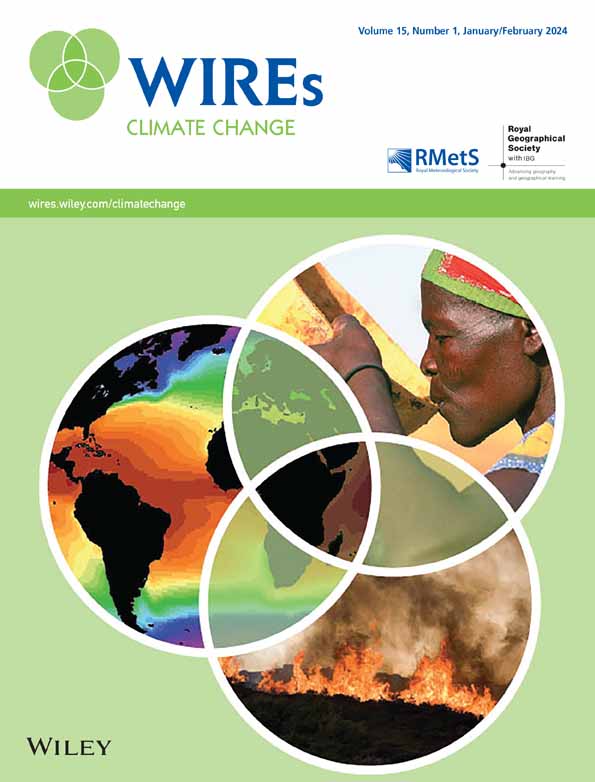Antarctica's vegetation in a changing climate
IF 10.3
1区 环境科学与生态学
Q1 ENVIRONMENTAL STUDIES
引用次数: 12
Abstract
Antarctica plays a central role in regulating global climatic and oceanographic patterns and is an integral part of global climate change discussions. The functioning of Antarctica's terrestrial ecosystems is dominated by poikilohydric cryptogams such as lichens, bryophytes, eukaryotic algae, and cyanobacteria and there are only two native species of vascular plants. Antarctica's vegetation is highly adapted to the region's extreme conditions but, at the same time, it is potentially highly susceptible to climatic fluctuations. Biological responses to shifts in temperature, water availability, wind patterns, snow, and ice cover are complex, taxa‐specific and act on different temporal and spatial scales. In maritime Antarctica, where warming and mass loss of outlet glaciers have been mainly observed, the vegetation is expected to show increases in productivity, abundance, and cover. In continental Antarctica, observational and experimental evidence is still sparse, but it is pointing toward even drier and harsher conditions for survival. We need more information on what the observed and predicted changes in Antarctic vegetation are for different regions and ecosystems. This will inform us how environmental change and human impact will shape the future of these ecosystems, and whether the speed and magnitude of change have habitat‐specific effects and implications. Antarctica's unique ecosystems are changing and in this review, we describe the current situation, tools to measure, and evaluate change and how change is likely to look in the future.

气候变化中的南极洲植被
南极洲在调节全球气候和海洋学格局方面发挥着核心作用,是全球气候变化讨论的一个组成部分。南极陆地生态系统的功能主要由地衣、苔藓植物、真核藻类和蓝藻等多水隐生植物主导,本土维管植物只有两种。南极洲的植被高度适应该地区的极端条件,但与此同时,它可能极易受到气候波动的影响。对温度、水分供应、风型、积雪和冰盖变化的生物响应是复杂的,具有分类群特异性,并在不同的时空尺度上起作用。在南极海域,主要观测到的是变暖和冰川出口的质量损失,预计植被的生产力、丰度和覆盖率将有所增加。在南极洲大陆,观测和实验证据仍然很少,但它指向更干燥、更严酷的生存条件。我们需要更多关于观测到的和预测的南极植被变化对不同地区和生态系统的影响的信息。这将告诉我们环境变化和人类影响将如何塑造这些生态系统的未来,以及变化的速度和幅度是否具有特定栖息地的影响和影响。南极洲独特的生态系统正在发生变化,在这篇综述中,我们描述了目前的情况、测量和评估变化的工具以及未来可能发生的变化。
本文章由计算机程序翻译,如有差异,请以英文原文为准。
求助全文
约1分钟内获得全文
求助全文
来源期刊

Wiley Interdisciplinary Reviews: Climate Change
METEOROLOGY & ATMOSPHERIC SCIENCES-
CiteScore
20.00
自引率
2.20%
发文量
58
审稿时长
>12 weeks
期刊介绍:
WIREs Climate Change serves as a distinctive platform for delving into current and emerging knowledge across various disciplines contributing to the understanding of climate change. This includes environmental history, humanities, physical and life sciences, social sciences, engineering, and economics. Developed in association with the Royal Meteorological Society and the Royal Geographical Society (with IBG) in the UK, this publication acts as an encyclopedic reference for climate change scholarship and research, offering a forum to explore diverse perspectives on how climate change is comprehended, analyzed, and contested globally.
 求助内容:
求助内容: 应助结果提醒方式:
应助结果提醒方式:


